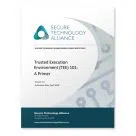
A new white paper that looks in-depth at Trusted Execution Environment (TEE) technology, the architecture and principles underpinning its operation and how it can be used to secure a variety of mobile wallet and IoT applications is now available to download free of charge from the NFC World Knowledge Centre... More


